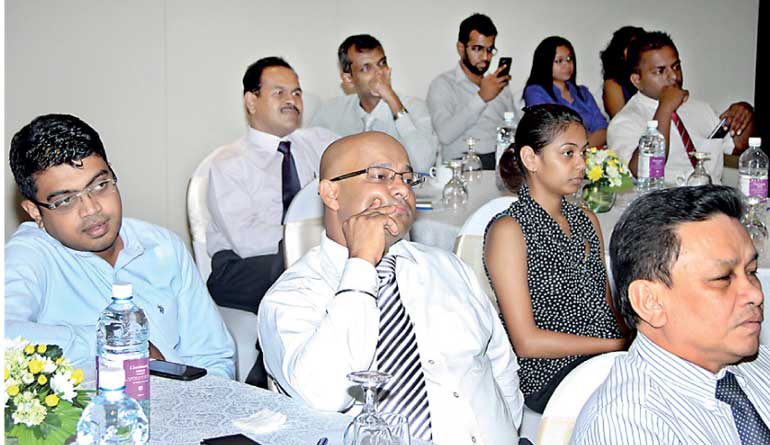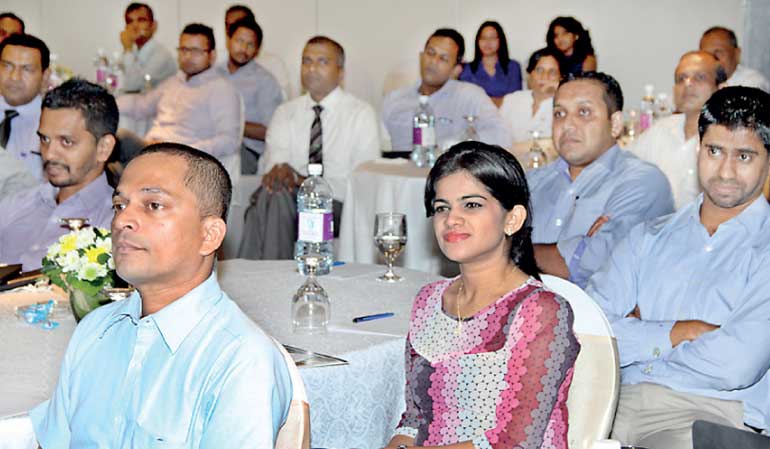Sunday Feb 22, 2026
Sunday Feb 22, 2026
Tuesday, 19 April 2016 00:10 - - {{hitsCtrl.values.hits}}

By Dian Abeyewardene
The Sri Lanka Institute of Directors (SLID) in its 15th year, having a membership of over 700 directors is focused on the importance of boardroom stewardship providing guidance and training to inculcate and encourage ethical behaviour and good corporate governance practices in their respective companies.
SLID presented an exciting evening with Mutthiah Muralitharan, the world record holder for the highest number of test wickets in the history of test cricket in the world! The spinning wizard of Sri Lanka fondly named ‘The Smiling Assassin’ is widely known for his broad smile and friendly demeanour. The amiable Murali with quick wit and determination to succeed shared his personal experiences, knowledge and insight on life’s journey, leadership and how to deal with varied situations.
Murali interviewed by Sanjeewa Jayaweera (who describes himself as an armchair critic on cricketing matters and presently the CFO of the Consumer Food and Retail Industry Group of John Keels) spoke with frank aplomb and his honest opinions and analysis was an outstanding revelation and an eye opener to all who were present.
Murali’s passion and love for the game of cricket had manifested in his very early years at St. Anthony’s College Katugastota, which he claims is the best school in Kandy! Well, he has reason to believe that what he learnt and how he had to achieve success at St. Anthony’s is what moulded him in to becoming a champion spinner and a world record holder!
Murali recalled how he was reserve for the school 1st XI team for three years, since Ruwan Kalpage, two years his senior and Piyal Wijethunge one year his senior, were the spinners in the team and both were taking 90 wickets each per season. His love for cricket and the desire to play for his school was long drawn out, but Murali says he never gave up and worked harder to improve his art of spinning. In the first opportunity Murali received to play for St Anthony’s in 1991 he captured 100 wickets and was selected the Bata Schoolboy Cricketer of the Year!
Murali was selected for his first overseas tour and was included in the team to England and New Zealand in 1991, but he says there was a big difference between Seniors and Juniors on tour and he came back having played a few matches and no wickets taken. He recalls with a wide grin how he was told by a senior spinner on the team to ‘go ask the grounds-man for a wicket’! Murali believes that playing cricket teaches great lessons in life. He perceived that cricket is a long game and you face different situations. At times you are down, and at times happy.

Pressure, disappointment, challenges and threat to keep your place
In addition, there is pressure, disappointment, challenges and the threat to keep your place. He went on to explain that it was very difficult to get a place in the team, after all only 11 can play in the team. When you get the opportunity and you don’t deliver, you could be dropped. To keep your place is even more difficult. Murali specifically remembered how rare a place in the team was, because some had played for 10 years and some for 20 years, which meant that a spot was not available.
After another tour to England where he took 4 & 7 wickets for a total of 11 wickets, he was dropped for the next tour, to give an opportunity to Ruwan Kalpage and Piyal Wijethunge. “I was really disappointed but I worked harder and played for the Tamil Union C & AC and captured 60 wickets. After the 1st Test, we lost amazingly at the SSC grounds while in a winning position against Australia. Arjuna Ranathunge the captain at that time called me up for the 2nd Test and from that point on I kept playing. My first 100 wickets took eight years (1991-1998) and my balance 700 wickets took a total of 10 years – from 1999-2009.”
Murali played for 17 years and 10 months and his career earned him 800 Test cricket wickets in 133 matches. 438 of those wickets were captured in the 53 matches that Sri Lanka won. He was adjudged ‘Player of the Series’ on 11 occasions, and won the ‘Man of the Match’ award 19 times which is the second highest ‘Man of the Match’ player in cricket history, second to Jacques Kallis the South African all-rounder whose career is longer than that of Murali’s.
Wisden Almanac 2002 named Murali as the ‘Best Ever Bowler’ eight years before he retired in 2010, which is a testimony of how great a bowler he was, of all times! His best ever bowling analysis in a single Test innings was when he captured 9/51 and 9/65 against England at The Oval in 2001 when Sri Lanka comprehensively beat England on English soil for the first time! The irony of Russel Arnold dropping a sitter to deprive Murali of a 10 wicket haul, was also remembered with a smile!
Murali compared the hard work on the cricket field to life on a day to day basis where he had to toil long hours to keep his body in good condition and then to innovate and improve his trade as a spinner to outwit the great batsmen in the world. He emphasised that if he didn’t keep performing well consistently, his place in the team would be at stake. The first time he was dropped early in his career, Murali confessed that he went to his father and voiced his feelings on, however much he loved and wants to play cricket, he felt he may not be good enough.
He questioned his father as to what he should do. After much discussion and dad’s advice, he joined ITS and studied for three months. But in the meantime he played for Tamil Union and worked even harder and Murali says hard work, commitment and dedication eventually paid off, even though he had to keep proving himself by taking more and more wickets.
Interviewed about the biggest challenge he faced in his life and career when he was ‘No Balled’ out of cricket, being charged with throwing and not bowling, Murali said it was really hard for him. He was confident and he knew in his mind that he was not throwing the ball, but it had to be proved. Murali admitted that it was a very stressful and painful time, but the support he got from his captain during that period was fantastic, and that helped him to face the challenge. Scientific research was the only solution.
Murali declared that he was confident to face any test to prove that he was not a ‘chucker’. An Indian Doctor from Apollo Hospital made a brace with a cast made of ‘plaster of paris’ to prevent the elbow being bent. Ravi Shastri was invited to watch Murali bowl with the cast and the entire process of testing Murali bowling with the cast was videoed, to prove to the public and to all those who accused Murali of throwing, that he could bowl and spin the ball without bending his elbow. He reminisced that under this heavy pressure he stayed calm and cool because he knew in his mind that he was not bending his elbow.
When the great day for the test arrived, the amazing facts of Murali’s unique body formation was discovered and revealed. From birth Murali was gifted with wrists like elastic and more importantly Ravi Shastri described Murali’s shoulders to be made of rubber, bouncing through his flexible action, bowling ‘Off Spin’, ‘Top Spinner’ ‘the ‘Floater’ and ‘Doosra’, proving beyond reasonable doubt that he did not bend his elbow through this action, as his elbow was firmly bound in the cast.
The ICC set the legal limit of 15 degrees of permissible straightening of the elbow joint for all bowlers in international cricket. More than 15% was defined as an ‘Illegal delivery’. However, Murali’s elbow was measured to bend at only 10%, clearing all doubts in the minds of those scrutinising his action.
Test of character
Murali confirms that the lesson from facing this immense challenge and pressure test, was a test of character. The ability to face any situation with a smile, such as in the 90’s when there were no stump cameras or microphones to record sledging, the world’s best cricketers especially the Australians, South African’s and the Englishmen of whom Nasser Hussain was outstanding, continued to sledge. Murali says that sledging was new to the Sri Lankans but the leadership skill and tactics of Arjuna Ranathunge helped him face the situation with a smile! Murali at this point gave some marvellous examples and qualities of a leader which was comparable to a Director in a Board Room.
Arjuna and Aravinda had instructed all the players to simply smile when they sledged ‘as if you don’t understand English’. Murali confessed that it was at this juncture that he learnt to simply keep smiling at all times. He was pleased when he recalled how the Aussies couldn’t take it when the Sri Lankans simply kept smiling! Subsequently, Arjuna started annoying them by not running for singles but merely walking for singles, and after reaching the score of about 60 runs, requesting the Umpire for a runner, which was not prohibited by law at that time.
The support extended by the captain he said was an outstanding quality of a great leader. Arjuna Ranathunga, Mahendra Singh Dhoni were two captains who understood their players’ capabilities, identified their skills and allowed them to perform getting good results. Such leaders would give the bowler the freedom to place their field, and then cover up if further correction was required. He described Mahela as another astute leader who knew how to pick players and identify their skills.
Murali compared this ability to that of directors in companies who judiciously identifies the skills of their departments and teams, taking in to consideration the strengths and abilities of the individuals. Once a person’s skill is identified, the leader can expect the maximum output related to that skill, rather than from any other areas not related to his abilities. Extremely skilful players such as Aravinda, Sangakkara and Sachin Tendulkar who have exceptional knowledge, talent and abilities and are extremely adaptable, expect similar performance from other players too!
Such a situation cannot bring out the best in the team member and as a result, most often, the overall performance suffers. The leadership traits in a director he said, was akin to that of a captain of the cricket team. One of the most successful captains he played under was Sanath Jayasuriya who consulted everyone, but finally took his own decision! He was very superstitious in everything he did, and immaterial as to where he was, on the day of a match, he would start the day by 6am with a visit to the temple. Somehow, Murali reported, that Sri Lanka won many matches during this period spanning 2001 to 2003.

The best team can make the best captain
Continuing on his views on the captains he had served under, he found that some of them were unsure of themselves and felt insecure and feared taking chances, resulting in the team being unable to perform at its best. At times ‘the best team can make the best captain’ observed Murali, such as Ricky Ponting being considered the most successful Australian Captain of all times. Murali was confident about the fact that a good leader is one who gets the best out of each player recognising their core potential, resulting in each of them performing at their best, with inevitable success.
The most outstanding ‘Wicket Taker’ of all times draws a parallel from his lifelong experiences between a Captain and a Director. His advice is not to expect all the others in the team to be equal to your own capabilities. A good leader should be understanding, winning the confidence of the team and encouraging them to do their part in giving of their best. Speaking through his experiences, Murali advocates, working hard at your job, exceling in what you do, and to keep on trying and never giving up! With another smile he quipped, “You must know when to retire from the game or your post, before you are asked to go or before you are dropped for not performing.” In Murali’s case he wanted to quit when he was at his peak, on having taken 792 wickets at the end of the 1sttest in Galle in 2009 against the best batting line up in the world who at that time was India.
Murali said that he was confident that he would do well in Galle being his favourite hunting ground and he recalls how Sri Lanka won the toss and scored over 300 runs on the first day, and alas, on the second day, rain washed out play! Murali sat wondering if he could get a chance to bowl at all! But then Sri Lanka declared having scored over 500 and India collapsed in the 1stinnings with Murali taking 5 wickets. India following on lost quick wickets and Murali picked up 2 more wickets and stood on 799!
Luck then smiled on him when Malinga who was taking all the wickets in the 2nd innings limped off the field with a leg injury! Then it was Murali operating with Rangana and the last Indian pair was at the crease. They kept up the fight with Ojha and Ishant Sharma refusing to give Murali the 800th test wicket. After bowling at the last pair, 15 overs with Rangana Herath, (7 overs each), a simple edge to the hands of Mahela off Murali, gave the record breaking 800th scalp! Looking back on this memorable moment, Murali called it ‘luck’ but in reality, it was the hard work that eventually paid off! Murali walked off the playing field in to business, to start all over again in another field – although late in his career!
The Sri Lanka Institute of Directors did well in picking a star spinning cricketer to address their membership, and the magical Muttiah Muralitharan mesmerised the directors and the business community, inspiring them to perform at their best, focusing on ethical leadership and good corporate governance practices. He smiled and continued to perform whilst the rest of the world sledged and shouted ‘foul’. Undeterred, Murali stood his ground, determined to succeed and bring glory to Sri Lanka!